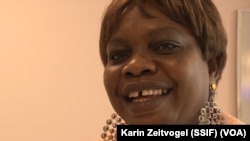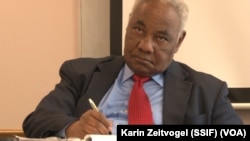NEW YORK —
Sanctions authorized last week by President Barack Obama against anyone found to be fomenting violence in South Sudan or blocking the peace process were a hot topic at a New York conference held at the weekend on the crisis in the young country.
South Sudan in Focus attended the conference, organized by Amir Idris, the chair of the Department of African and African American Studies at Fordham University, and gathered reactions from South Sudanese expatriates to the sanctions. The sanctions have not yet been implemented, the U.S. State Department said on Tuesday.
Here are some of the main comments from attendees at the conference. Add your own reactions in the comments section below.
“I feel like our government needed this pressure a long time ago, even before the December event, because there has been serious corruption going on, serious negligence to the people.”
"A lot of people suggest that it is about time that world leaders -- from Europe, from the United States, from Africa -- spoke up against the absurdity of this war."
"Perhaps the sanctions will spur the government of Juba to give a more meaningful commitment to the peace talks. Or, it could drive them towards rogue behavior or towards alliances with Khartoum, with Bashir, a country already under U.S. sanctions -- and the sanctions haven't caused it to collapse, as it was hoped they would do. The lack of historical evidence that sanctions work might cause... the leaders in Juba to simply turn away, and in that way, the United States will have denied itself the ability to exercise the leverage, the clout it has over South Sudan."
"Sanctions are blunt instruments. They are not selective enough to avoid people for whom they are not intended and hurt people who are innocent. So the last thing we want is a sanction."
"If the sanctions are implemented, I think they will have an impact on the leaders. The good thing is... (President Obama) didn't order blank sanctions for the whole of South Sudan. He targeted participants in the current conflict and those who abused human rights. If they're implemented effectively, I think they'll work for the better of the majority of South Sudanese... "- Jane Kani Edward, clinical assistant professor and director of African Immigration Research, Department of African and African American Studies, Fordham University
“The sanctions, for ordinary people, it’s nothing for them. But for the officials, those who are in the government, when they see the sanctions, maybe they will change their minds and work for peace.”
South Sudan in Focus attended the conference, organized by Amir Idris, the chair of the Department of African and African American Studies at Fordham University, and gathered reactions from South Sudanese expatriates to the sanctions. The sanctions have not yet been implemented, the U.S. State Department said on Tuesday.
Here are some of the main comments from attendees at the conference. Add your own reactions in the comments section below.
"A lot of people suggest that it is about time that world leaders -- from Europe, from the United States, from Africa -- spoke up against the absurdity of this war."Jok Madut Jok
“I feel like our government needed this pressure a long time ago, even before the December event, because there has been serious corruption going on, serious negligence to the people.”
- Sarah Cleto Rial, women's rights activist, program director at My Sister's Keeper, 2010 recipient of Eleanor Roosevelt Human Rights Award
"A lot of people suggest that it is about time that world leaders -- from Europe, from the United States, from Africa -- spoke up against the absurdity of this war."
"Perhaps the sanctions will spur the government of Juba to give a more meaningful commitment to the peace talks. Or, it could drive them towards rogue behavior or towards alliances with Khartoum, with Bashir, a country already under U.S. sanctions -- and the sanctions haven't caused it to collapse, as it was hoped they would do. The lack of historical evidence that sanctions work might cause... the leaders in Juba to simply turn away, and in that way, the United States will have denied itself the ability to exercise the leverage, the clout it has over South Sudan."
- Jok Madut Jok, history professor at Loyola Marymount University, California; executive director and co-founder of Sudd Institute think tank, Juba; former undersecretary at South Sudanese Ministry of Culture
"Sanctions are blunt instruments. They are not selective enough to avoid people for whom they are not intended and hurt people who are innocent. So the last thing we want is a sanction."
- David Bassiouni, career diplomat, businessman
"I think it's going to have an enormous impact on the government and the opposition. Both of them will begin to rethink their positions and take the peace talks more seriously. But also it will have an impact on the people of South Sudan. They reacted positively to the signing of the executive order by President Obama."
- Amir Idris, chair of Department of African and African American Studies, Fordham University, New York
"If the sanctions are implemented, I think they will have an impact on the leaders. The good thing is... (President Obama) didn't order blank sanctions for the whole of South Sudan. He targeted participants in the current conflict and those who abused human rights. If they're implemented effectively, I think they'll work for the better of the majority of South Sudanese... "
- Jane Kani Edward, clinical assistant professor and director of African Immigration Research, Department of African and African American Studies, Fordham University
“The sanctions, for ordinary people, it’s nothing for them. But for the officials, those who are in the government, when they see the sanctions, maybe they will change their minds and work for peace.”









